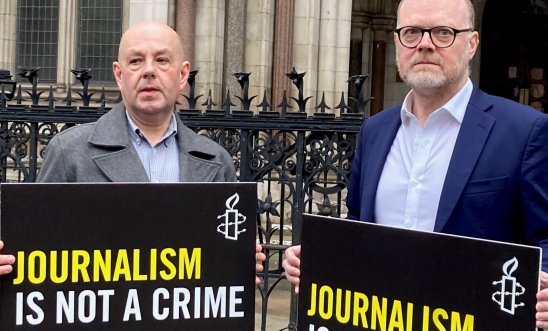PSNI and Metropolitan Police officers broke the law by spying on two Northern Irish journalists a tribunal has found.
In a landmark ruling issued today, the Investigatory Powers Tribunal (IPT) found journalists Barry McCaffrey and Trevor Birney were unlawfully spied on by the police forces in a bid to uncover their sources.
The IPT was examining a complaint by the journalists who asked the body, which is the only British court with statutory powers to investigate secret police surveillance, to find out whether police used surveillance powers against them.
Mr Birney and Mr McCaffrey were arrested in 2018 in connection to their work investigating the 1994 Loughinisland massacre for their 2017 television documentary No Stone Unturned.
The film revealed police colluded to protect loyalist gunmen who murdered six Catholic men while they watched a World Cup football match in pub in 1994.
The pair filed a complaint with the IPT after a court in Belfast ruled the 2018 search warrants and their arrests were unlawful.
 Barry McCaffrey (left) and Trevor Birney (right) outside the Royal Courts of Justice, London (Pic: Amnesty UK)
Barry McCaffrey (left) and Trevor Birney (right) outside the Royal Courts of Justice, London (Pic: Amnesty UK)The five-year investigation came to a close this week with the judgement of tribunal President Lord Justice Singh and Lady Carmichael as agreed by Stephen Shaw KC, which found multiple police actions against the journalists were unlawful.
Over the course of the investigation it was discovered that the PSNI had previously accessed Mr McCaffrey’s phone while he was investigating potential corruption in the force.
Other disclosures by the police to the tribunal revealed further incidents of police surveillance – including that that the Metropolitan Police, acting on behalf of the PSNI, had unlawfully obtained telephone data belonging to Barry McCaffrey and the then BBC journalist Vincent Kearney in 2012.
This data was then unlawfully shared with the PSNI and Durham Constabulary when Mr Birney and Mr McCaffrey were arrested.
It was also revealed that the Metropolitan Police, again acting on behalf of the PSNI, obtained more than 4,000 text messages and phone communications belonging to Mr Birney and Mr McCaffrey as well as more than a dozen journalists who were working for BBC Northern Ireland’s investigative TV programme Spotlight.
It was also revealed that former PSNI Chief Constable Sir George Hamilton had unlawfully authorised a spying operation against an official at the Office of the Police Ombudsman of Northern Ireland.
At the conclusion of the IPT investigation, the body found that the PSNI had repeatedly acted unlawfully, in breach of the European Convention of Human Rights and the Human Rights Act 1998 and added that the police force had failed to consider whether there was "an overriding public interest justifying an interference with the integrity of a journalistic source”.
Today, PSNI Chief Constable Jon Boutcher said he “accepted that due consideration was not given to whether there was an overriding public interest in interfering with journalistic sources before authorising surveillance."
The IPT has ordered the PSNI to pay £4,000 in damages to both journalists for unlawful intrusion – marking the first time that the body has made such an order.
Patrick Corrigan, Amnesty International’s Northern Ireland Director has called the ruling a “landmark case for press freedom”.
“The right of journalists to protect their sources is a cornerstone of a free society, and the PSNI saw fit to ride roughshod over every human rights safeguard designed to protect that right,” he said.
“The revelation via the Tribunal that the PSNI spied on staff from the Office of the Police Ombudsman – the statutory body which investigates police wrongdoing – should worry everyone who cares about policing and police oversight in Northern Ireland,” he added.
“The truth has had to be dragged kicking and screaming into the light, and today’s judgment is testament to the tenacity and determination shown by Trevor Birney and Barry McCaffrey.
“Accountability must follow culpability and we now need cast-iron safeguards to prevent the PSNI from further abuse of covert surveillance powers against journalists and others in Northern Ireland.
“There can be no recurrence of the unlawful practices which have seen the police treat press freedom with utter contempt.
“While the police saw fit to arrest journalists exposing police collusion in protecting the paramilitary killers of six men in the village of Loughinisland in June 1994, twenty years on they have still arrested no-one for those murders.
“Our thoughts are with the bereaved families on this day.”
Sinn Féin MPs John Finucane has also wecomed today's ruling, describing it as "resoundingly and rightly in favour of the powerful work of journalists, including the exceptional Trevor Birney and Barry McCaffrey".
“As these investigative journalists carried out their job, including assisting victims and families, police forces and state bodies from across these islands sought to criminalise them for doing so," he said.
“This is a momentous day vindicating the work and relentless determination of these two remarkable journalists.”

